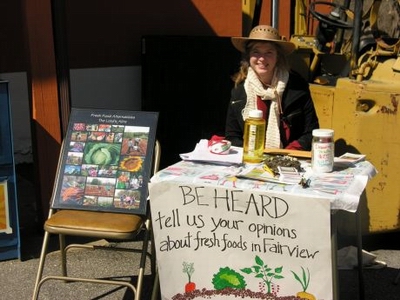
From 2011 to 2012, Susan Sides, Cameron Farlow, and numerous volunteers were ubiquitous around town the town of Fairview, NC, sitting outside popular restaurants, tracking people down in the library, and leading group conversations. Their mission? Find out how residents of Fairview—a town of 8,000 just outside of Ashville—view their ability to “buy, store, grow, prepare and enjoy healthful food.”
Sides serves as executive director of The Lord’s Acre, whose mission, according to her, is to “build community by growing food and giving it away” in a part of the state where a staggering 29 percent of children under 18 are food insecure. Committed to setting its strategy based on actual needs in the community, Sides teamed up with Farlow, an AmeriCorps volunteer, to write a community food assessment for Fairview. The results would, as Sides says, help The Lord’s Acre (which gives away food it grows through its pantry) create an accurate map of both Fairview’s food resources and needs, and hopefully lead to policies that would make quality food accessible to more residents.
“We wanted to make sure we were listening to the whole community, not just the pantry clients,” Sides tells TakePart.
This focus on the entire community—not just low-income neighbors—is a common theme in the groundswell of community food assessments that have popped up in cities over the last decade, says Andy Fisher. Fisher, while a graduate student at UCLA, cowrote the first manual on conducting a food assessment in 2002. The organization Fisher founded and ran for 17 years, the Community Food Security Coalition, assisted numerous communities in conducting assessments of their food landscapes before it closed its doors last year. Assessments might focus on urban agriculture, entire counties, food access, or more farm-centered issues, Fisher says, but he adds that in city after city, the process proves just as important as the final assessment.
“We wanted to help community groups engage residents in the process so it wasn’t a top-down exercise. We saw it as kind of a great tool to achieve things we were really struggling with—avoid projects being led by a professional staff,” Fisher says. “It would set up a process in which those folks would be engaged after the assessment was over in implementing those results.”
For instance, he says, a community that discovered a gap in the number of grocery stores might take those results and work to establish a new farmers market or co-op. Or responses from farmers in another community might reveal the need for cooperative sales and marketing strategies.
In Fairview, the survey responses led to the establishment of a “Share the Harvest Market,” which invites gardeners throughout Buncomb County to bring their excess produce and meet their neighbors. The market draws residents from all segments of society because, as Sides says, a lack of access to fresh, tasty food often affects everyone—not just the poor. The mission of Share the Harvest Market also fits remarkably with the original mission of The Lord’s Acre, which started as a Depression-era call to farmers to set aside an acre of food to donate to the hungry.
“That fills the need for folks to have a market, but it’s not a market,” she says.
Sadly, with cuts to the federal Supplemental Nutrition Assistance Program (SNAP) likely, programs like The Lord’s Acre will be that much more crucial in the fight to curb food insecurity. For Sides, knowing how to address the complexities of the her neighbors’ relationship to food started with a frighteningly simple first step: talking to them.
For more information on conducting a community food assessment in your neighborhood or city, the Centers for Disease Control have compiled a number of helpful resources to get you started.





